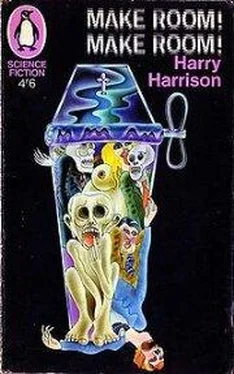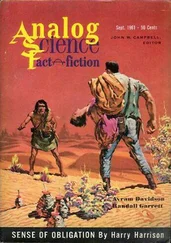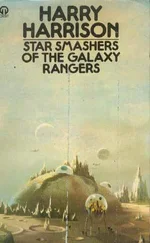Harry Harrison - Make Room! Make Room!
Здесь есть возможность читать онлайн «Harry Harrison - Make Room! Make Room!» весь текст электронной книги совершенно бесплатно (целиком полную версию без сокращений). В некоторых случаях можно слушать аудио, скачать через торрент в формате fb2 и присутствует краткое содержание. Год выпуска: 1966, ISBN: 1966, Издательство: Doubleday, Жанр: Социально-психологическая фантастика, на английском языке. Описание произведения, (предисловие) а так же отзывы посетителей доступны на портале библиотеки ЛибКат.
- Название:Make Room! Make Room!
- Автор:
- Издательство:Doubleday
- Жанр:
- Год:1966
- ISBN:425-02390-7
- Рейтинг книги:5 / 5. Голосов: 1
-
Избранное:Добавить в избранное
- Отзывы:
-
Ваша оценка:
- 100
- 1
- 2
- 3
- 4
- 5
Make Room! Make Room!: краткое содержание, описание и аннотация
Предлагаем к чтению аннотацию, описание, краткое содержание или предисловие (зависит от того, что написал сам автор книги «Make Room! Make Room!»). Если вы не нашли необходимую информацию о книге — напишите в комментариях, мы постараемся отыскать её.
Make Room! Make Room! — читать онлайн бесплатно полную книгу (весь текст) целиком
Ниже представлен текст книги, разбитый по страницам. Система сохранения места последней прочитанной страницы, позволяет с удобством читать онлайн бесплатно книгу «Make Room! Make Room!», без необходимости каждый раз заново искать на чём Вы остановились. Поставьте закладку, и сможете в любой момент перейти на страницу, на которой закончили чтение.
Интервал:
Закладка:
Harry Harrison
Make Room! Make Room!
To
TODD and MOIRA
For your sakes, children,
I hope this proves to be a work of fiction.
Introduction
One of the most ominous trends in a world replete with ominous trends is the accelerating growth of urban populations. In part, this is directly due to the population explosion — people are being born at a faster rate than they are dying. But population growth also contributes indirectly. For instance, as the total world population skyrockets, more and more pressure develops to mechanize farming, and farm workers displaced by tractors and combines go to seek their fortunes in the city. And, of course, many people just prefer to live in cities.
The results of the “population explosion” in cities are getting increasing publicity. Tokyo Bay is frantically being filled with garbage in order to obtain land for expansion of a city already so crowded that there is a two-year wait for middle class apartments. Calcutta today has hundreds of thousands of people living homeless in its streets; yet it seems inevitable that Calcutta’s population will increase to 12 million by 1990, if the city grows only as fast as the rest of India. In the underdeveloped countries, cities increased in size by 55 percent in the decade 1950-1960. When the data for 1960-1970 are available, urban growth for that decade can be expected to have been even more spectacular. The inability of those countries to care for their burgeoning urban populations is easily seen in the spectacular slums associated with them. Less visible are the high rates of unemployment and social unrest that follow such rapid urbanization.
The developed countries, with an overall rate of urban growth less than half that of the poor nations, have also faced increasingly serious problems in their cities. These have been especially intense in the United States, where the urban population has more than doubled in the last half century, and the proportion of urban dwellers has changed from less than half of the population to nearly three-fourths. The problems of American cities, such as the degeneration of city centers and uncontrolled growth and development at the periphery, have been the topic of an enormous volume of literature. The cities themselves have been the target of numerous, often unsuccessful programs of rehabilitation.
Projection of even the mid-range future of urban areas presents well nigh insuperable problems. We can be reasonably sure of some things, however. For instance, the current pattern of urban population growth won’t continue much past the turn of the century. Demographer Kingsley Davis has projected those growth trends, with startling results. If the post-1950 rates of urban growth continue to 1984, half of the human race will be living in cities. By 2023 everyone would live in an urban area, and by 2044 everyone would live in cities with a million or more population. If by some negative miracle the trends continued that long, the largest “city” would have a population of 1.4 billion souls, one of every 10 human beings.
But the results of such projections, while instructive, are also preposterous. We know things won’t work out that way as far as the numbers living in cities are concerned. Moreover, we are completely ignorant of future trends in urban living conditions. We must leave these to our imaginations — or better yet to the talented imaginations of writers like Harry Harrison. Make Room! Make Room! presents a gripping scenario of where current trends may be leading. Such scenarios are important tools in helping us to think about the future, and in bringing home to people the possible consequences of our collective behavior. When such a serious goal can be achieved through an engrossing work of fiction we are doubly rewarded. Thank you, Harry Harrison.
Paul R. Ehrlich
PROLOGUE
In December, 1959, The President of the United States, Dwight D. Eisenhower, said: “This government… will not… as long as I am here, have a positive political doctrine in its program that has to do with this problem of birth control. That is not our business.” It has not been the business of any American government since that time.
In 1950 the United States — with just 9.5 per cent of the world’s population — was consuming 50 per cent of the world’s raw materials. This percentage keeps getting bigger and within fifteen years, at the present rate of growth, the United States will be consuming over 83 per cent of the annual output of the earth’s materials. By the end of the century, should our population continue to increase at the same rate, this country will need more than 100 per cent of the planet’s resources to maintain our current living standards. This is a mathematical impossibility — aside from the fact that there will be about seven billion people on this earth at that time and — perhaps — they would like to have some of the raw materials too.
In which case, what will the world be like?
MONDAY, AUGUST 9, 1999
NEW YORK CITY — stolen from the trusting Indians by the wily Dutch, taken from the law-abiding Dutch by the warlike British, then wrested in turn from the peaceful British by the revolutionary colonials. Its trees were burned decades ago, its hills leveled and the fresh ponds drained and filled, while the crystal springs have been imprisoned underground and spill their pure waters directly into the sewers. Reaching out urbanizing tentacles from its island home, the city has become a megalopolis with four of its five boroughs blanketing half of one island over a hundred miles long, engulfing another island, and sprawling up the Hudson River onto the mainland of North America. The fifth and original borough is Manhattan: a slab of primordial granite and metamorphic rock bounded on all sides by water, squatting like a steel and stone spider in the midst of its web of bridges, tunnels, tubes, cables and ferries. Unable to expand outward, Manhattan has writhed upward, feeding on its own flesh as it tears down the old buildings to replace them with the new, rising higher and still higher — yet never high enough, for there seems to be no limit to the people crowding here. They press in from the outside and raise their families, and their children and their children’s children raise families, until this city is populated as no other city has ever been in the history of the world.
On this hot day in August in the year 1999 there are — give or take a few thousand — thirty-five million people in the City of New York.
PART ONE
1
The August sun struck in through the open window and burned on Andrew Rusch’s bare legs until discomfort dragged him awake from the depths of heavy sleep. Only slowly did he become aware of the heat and the damp and gritty sheet beneath his body. He rubbed at his gummed-shut eyelids, then lay there, staring up at the cracked and stained plaster of the ceiling, only half awake and experiencing a feeling of dislocation, not knowing in those first waking moments just where he was, although he had lived in this room for over seven years. He yawned and the odd sensation slipped away while he groped for the watch that he always put on the chair next to the bed, then he yawned again as he blinked at the hands mistily seen behind the scratched crystal. Seven… seven o’clock in the morning, and there was a little number 9 in the middle of the square window. Monday, the ninth of August, 1999 — and hot as a furnace already, with the city still imbedded in the heat wave that had baked and suffocated New York for the past ten days. Andy scratched at a trickle of perspiration on his side, then moved his legs out of the patch of sunlight and bunched the pillow up under his neck. From the other side of the thin partition that divided the room in half there came a clanking whir that quickly rose to a high-pitched drone.
Читать дальшеИнтервал:
Закладка:
Похожие книги на «Make Room! Make Room!»
Представляем Вашему вниманию похожие книги на «Make Room! Make Room!» списком для выбора. Мы отобрали схожую по названию и смыслу литературу в надежде предоставить читателям больше вариантов отыскать новые, интересные, ещё непрочитанные произведения.
Обсуждение, отзывы о книге «Make Room! Make Room!» и просто собственные мнения читателей. Оставьте ваши комментарии, напишите, что Вы думаете о произведении, его смысле или главных героях. Укажите что конкретно понравилось, а что нет, и почему Вы так считаете.











